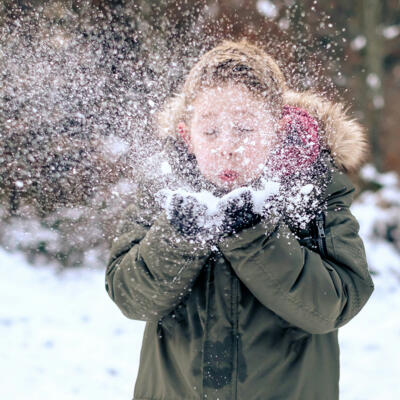5 Practical Ways to Support Foster Children over the Festive Season
Wednesday 13 November 2024
Last updated: Wednesday 11 February 2026
 For children in foster or adoptive homes, the holiday season can be both joyful and overwhelming. Celebrating Christmas with a child who has experienced trauma or is adjusting to a new family dynamic requires sensitivity, understanding, and flexibility.
For children in foster or adoptive homes, the holiday season can be both joyful and overwhelming. Celebrating Christmas with a child who has experienced trauma or is adjusting to a new family dynamic requires sensitivity, understanding, and flexibility.
While the holiday season is often a time of fun and excitement for adults, it is important to acknowledge that Christmas can bring feelings of comparison, loss, and sadness for many children. These emotions deserve space and recognition as well.
By creating a safe, low-stress environment, families can help foster children feel secure, valued, and loved during this special time of year, while matching the holiday experience to their current developmental abilities.
Many strategies may be helpful for your foster child, and it’s also important to get creative and consider what works best for them individually. Here are five effective ways to create a nurturing and positive holiday experience, tailored to a child’s unique needs.
-
Focus on Needs Over Wants
While gifts are often central to Christmas, prioritising a child’s emotional and developmental needs is far more valuable than showering them with presents.
- Avoid overwhelm when gifting
Some children, particularly those with traumatic pasts, can feel overwhelmed by sensory overload or an abundance of gifts. It can also be helpful to consider if there is a gift they will be very excited about that you could gift them earlier to manage anxiety and excitement.
- Foster a sense of belonging
Consider meaningful interactions and therapeutic activities that provide comfort, security, and connection. Activities like baking together, reading holiday stories, or decorating as a family can help foster children feel included and appreciated. Focus on building a sense of belonging and nurturing a connection that transcends material items.
-
Provide a Calm, Low-Key Environment
For foster (and adoptive) children, the holiday season can sometimes feel more overwhelming than enjoyable. It’s important to consider how new experiences and changes in routine may affect them.
- Set expectations
Explaining expectations in advance can help alleviate any anxiety around what’s to come. Maintaining consistent routines, such as mealtimes and bedtimes, can help foster a sense of stability and safety during the holidays. Additionally, plan breaks into your day, check in with your foster child to see how they are feeling, and work with them to manage over-excitement, ensuring they feel supported throughout the festivities.
- Be aware of sensory needs
Be mindful of their sensory needs, as sensory overload from loud noises, bright lights, or crowded spaces can be especially challenging. For some children, a calm and simple environment with minimal decorations and familiar routines can provide a sense of security.
- Take it easy
Large gatherings, noisy celebrations, or unexpected visitors may trigger feelings of anxiety, so it can be helpful to celebrate with just immediate family and keep the day’s schedule relaxed.
-
Emphasize Quality Time and Attachment-Focused Activities
The holiday season presents a wonderful opportunity to strengthen bonds with foster children through quality time and attachment-focused activities. This time allows us to engage in meaningful experiences that promote connection and trust.
- Activities to do together
Consider activities that foster teamwork, such as collaborative games where everyone works together toward a common goal. For example, adapt games like Jenga—instead of focusing on winning or losing, challenge yourselves to see how high the tower can go as a team, aiming to beat your own record.
Another option is to modify Cluedo by having all players work together to solve the mystery of who, what and where, uncovering the solution before time runs out or a set number of turns pass.
In addition to games, activities like sharing stories or creating simple Christmas crafts together can also promote bonding. For more ideas, see the Theraplay Advent Calendar at the bottom of this article.
- Foster a sense of security
Physical closeness, eye contact, and shared experiences nurture a sense of love and security. Even small gestures like setting aside a daily “unwind time,” can make a big difference, helping children feel seen, valued, and cared for.
-
Set Boundaries with Extended Family and Friends
The holiday season often brings added stress with visits from extended family, friends, and neighbours. By setting clear boundaries with loved ones, you can ensure a therapeutic atmosphere that helps the child feel safe, grounded, and in control of their surroundings.
- Explain any necessary adjustments early on
When it comes to extended family, setting clear expectations early is essential to ensure a calm, child-centred holiday. It’s helpful to communicate to family members what may need to be different to support the child’s emotional regulation. For example, let them know that if the child becomes overstimulated or needs a break, it’s important to respect those cues.
- Consider scaling back
Large gatherings or excessive attention from unfamiliar faces can quickly overwhelm children, so it’s best to limit the number of guests and discourage relatives from showering the child with too many gifts or focusing too much attention on them. Instead, encourage family members to help with holiday tasks or provide emotional support, creating a stress-free environment for everyone.
-
Create Unique Traditions
Every family has its own holiday traditions, but for children who are new to a home, establishing fresh, simple rituals can help them feel truly included.
- Personalise traditions
Instead of relying on elaborate or pre-existing traditions, focus on creating personalised ones that the child can look forward to each year. Consider the traditions they may expect and what you envision for the family, and use those ideas to inspire something new. This might mean having a dinosaur as the tree topper, hosting a Christmas Eve Pyjama Party, or serving chicken nuggets on a Christmas plate.
Simple activities such as making a holiday-themed craft together, taking a family photo, or picking a favourite story to read on Christmas Eve can also become cherished traditions. These unique family practices offer comfort, stability, and positive memories that children can carry with them for years to come.
- Be mindful of those who may not be physically present
Additionally, it’s important to be mindful of those who may not be physically present during the holidays—whether due to death, loss or separation, both for the child and yourselves. Consider ways to honour those who can’t join in the celebrations by incorporating a special tradition to remember them during the festivities, thereby modelling different ways to celebrate, despite the feeling of loss.
Additional Tips for a Stress-Free Christmas
When considering the needs of the children in your care, it’s essential to view the situation through the lens of developmental trauma. This means thinking about brain development from a bottom-up approach—starting with sensory processing, dissociation, attachment, emotions, and behaviour and extending to cognition and self-esteem.
Beyond the five main strategies above, keeping sensory sensitivities and emotional triggers in mind can also make a big difference. Loud music, strong scents, and excessive decorations may trigger anxiety or negative memories. Providing a structured schedule for Christmas Day or spreading out gift-giving over a few days can help children avoid feeling overwhelmed.
Remember, the holiday is ultimately about togetherness, not perfection. For both parents and children, finding moments of connection is what makes this season truly magical.
By focusing on simplicity, routine, and creating a loving environment, foster parents can help children feel more relaxed, allowing everyone to enjoy the holiday season in a way that celebrates family, love, and belonging.
Tips for Creating a Relationship-Focused Holiday Season with the Theraplay Advent Calendar
You may want to turn your full December into a month of focus on the relationship. The Theraplay Advent Calendar, created by Mary Kennedy, Tory Kerneen, and Fiona Peacock, is designed to strengthen parent-child relationships during the holiday season.
Theraplay emphasizes building attachment and fostering connection, and this calendar offers playful daily activities to help achieve just that. All these activities are designed to facilitate nurturing, engaging, challenging, and structured interactions.
There’s no “right” or “wrong” way to do these activities—just have fun together! Each activity can be printed, cut out, and placed into an advent calendar with small boxes or pockets. Alternatively, you can place the activities in a jar and enjoy a daily “lucky dip.” Only December 24 and 25 include specific, pre-set activities; the rest are flexible to fit any day leading up to Christmas.
Theraplay Advent Calendar |
||||
| 1. Sing Jingle Bells to each other | 2. Feed each other Christmas goodies | 3. Create a Santa’s beard on each other | 4. Practice reindeer galloping with Rudolph noses | 5. Have a snowball fight with cotton wool balls |
| 6. Play beep and honk with Christmassy sounds | 7. Make family reindeer prints | 8. Make or buy a gift for someone | 9. Play “Fish and Chips” with Ho, Ho, Ho | 10. Pull a huge pretend Christmas cracker |
| 11. Give each other a hand massage with lotion | 12. Do a Christmas-themed “spot the difference” | 13. Bean bag drops with Christmas items | 14. Repeat the worst Christmas cracker joke | 15. Wrap someone like a Christmas present |
| 16. Be Santa and his sleigh – Rudolph wheelbarrow | 17. Tell the Christmas story on someone’s back | 18. How many bites can you take out of a Christmas treat? | 19. Make someone a “pigs in blankets” | 20. Do a Christmas-themed Simon Says activity |
| 21. Build a family hand-stack Christmas tree | 22. Sing a Christmas song with actions | 23. Shake powder or flour onto hands for snowflake | 24. Leave a snack for Santa and a note | 25. Sing “We wish you a Merry Christmas” to each other |
| Credit: Mary Kennedy, Tory Kerneen and Fiona Peacock November 2020 Theraplay UK | Therapy for Children and Families | ||||
References
This article draws on several online resources that offer valuable ideas and practical guidance for supporting children through the Christmas period, particularly those in adoptive or foster care. Some of these sources have contributed directly to the content presented in this summary:
- Beacon House provides an insightful guide on supporting traumatised children during the holiday season: Supporting Traumatized Children Through the Christmas Storm
- Adoption MWWales offers helpful tips for helping adopted children navigate the holiday season
- First4Adoption shares a Christmas survival plan with tips for adoptive parents: Christmas Survival Plan: Tips from an Adoptive Mum
- Adopters for Adoption offers advice on planning for Christmas with looked after children: Planning for Christmas with an Adopted Child
- Adoption Matters provides additional Christmas tips for families: Christmas Tips for Adoptive Families
These resources provide further ideas, strategies, and support for making the holiday season more manageable and joyful for children in care.
